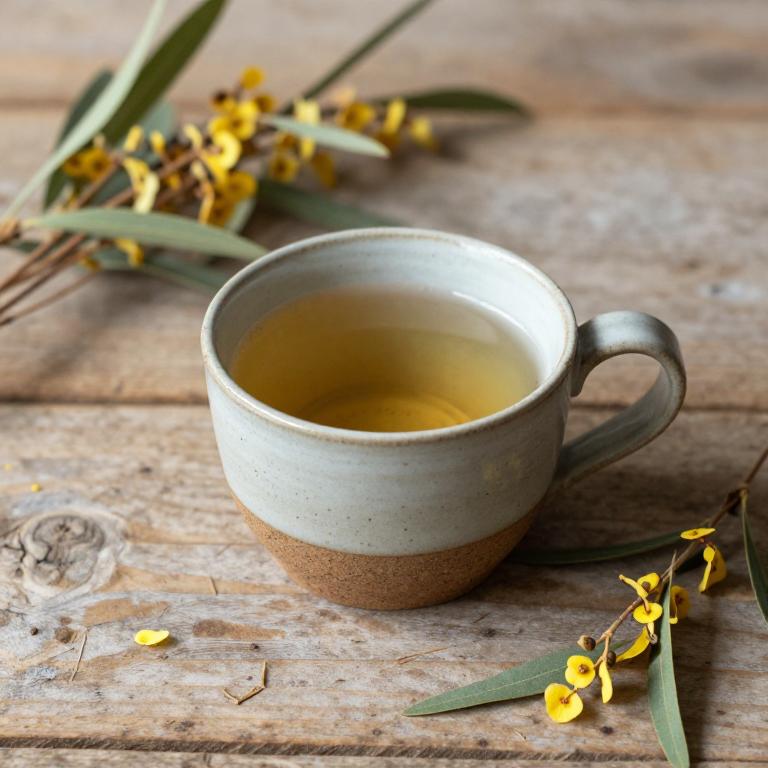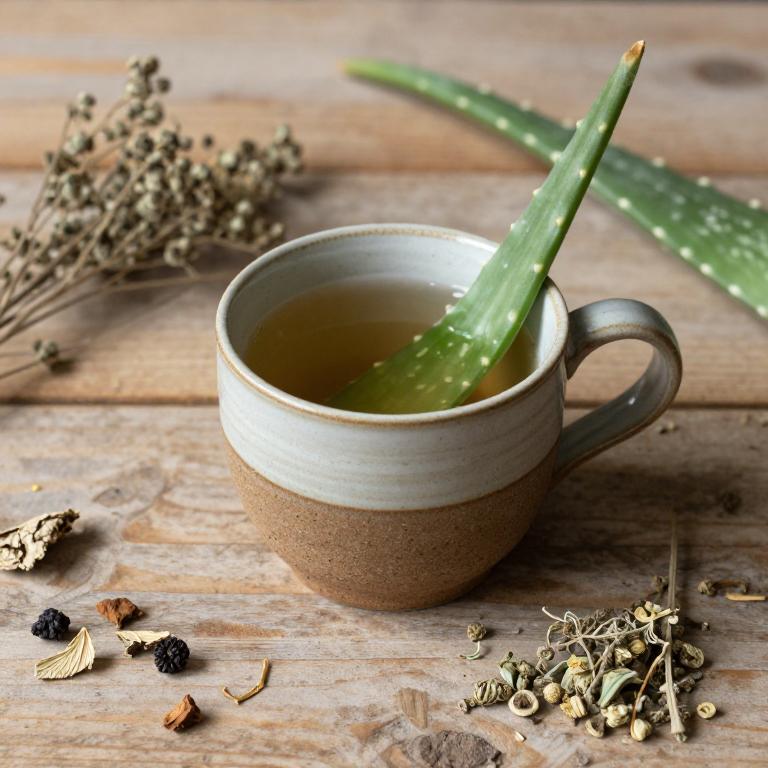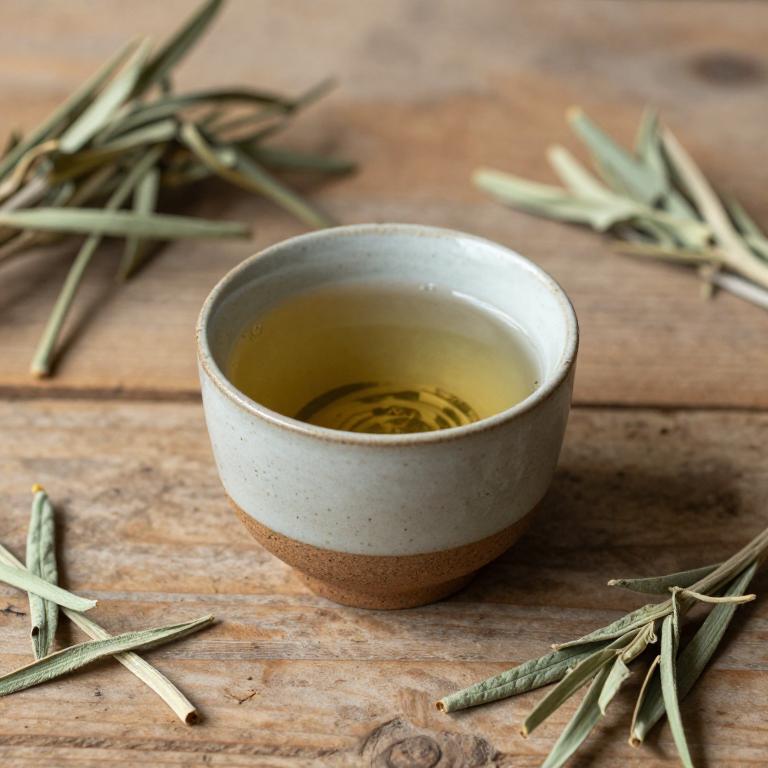10 Best Herbal Teas For Oily Hair

Herbal teas can be an effective and natural way to care for oily hair, as they contain ingredients that help balance oil production and soothe the scalp.
Popular choices include green tea, nettle tea, and chamomile tea, each offering unique benefits such as antimicrobial properties, anti-inflammatory effects, and scalp rejuvenation. These teas can be used as a rinse after shampooing to reduce excess sebum and promote a healthier scalp environment. Regular use may help prevent dandruff and improve overall hair texture without the use of harsh chemicals.
Incorporating herbal teas into a hair care routine can be a gentle, holistic approach to managing oily hair and maintaining a balanced scalp.
Table of Contents
- 1. Camellia (Camellia sinensis)
- 2. Stinging nettle (Urtica dioica)
- 3. Field horsetail (Equisetum arvense)
- 4. Salvia (Salvia officinalis)
- 5. Melaleuca (Melaleuca alternifolia)
- 6. St. john's wort (Hypericum perforatum)
- 7. Rosemary (Rosmarinus officinalis)
- 8. English lavender (Lavandula angustifolia)
- 9. Aloe vera (Aloe barbadensis)
- 10. Lemon grass (Cymbopogon citratus)
1. Camellia (Camellia sinensis)

Camellia sinensis, the plant from which green tea is derived, is often used in herbal teas that are beneficial for oily hair due to its rich content of antioxidants and polyphenols.
These compounds help regulate sebum production, reducing excess oiliness on the scalp and preventing hair from becoming weighed down. Regular use of camellia sinensis herbal teas can also soothe inflammation and promote a healthy scalp environment. To use it, you can steep the tea leaves in hot water and apply the cooled liquid to the scalp as a rinse after shampooing.
This natural remedy offers a gentle, effective way to manage oily hair without harsh chemicals.
2. Stinging nettle (Urtica dioica)

Urtica dioica, commonly known as stinging nettle, is a powerful herb that has been used for centuries in traditional medicine for its various health benefits.
When used in the form of herbal teas, stinging nettle can be particularly beneficial for individuals with oily hair, as it helps to balance sebum production and cleanse the scalp. The tea is rich in minerals like silica, iron, and potassium, which can strengthen hair follicles and promote healthier hair growth. Regular use of urtica dioica tea as a scalp rinse or rinse can reduce excess oil, soothe irritation, and improve overall scalp health.
This natural remedy offers a gentle yet effective alternative to commercial shampoos for those seeking a natural approach to managing oily hair.
3. Field horsetail (Equisetum arvense)

Equisetum arvense, commonly known as field horsetail, is a herbal plant that has been traditionally used for its high silica content, which is believed to strengthen hair and scalp health.
When brewed into a herbal tea, it can help balance oil production in the scalp, making it a beneficial option for those with oily hair. The tea is often used as a rinse rather than a regular beverage due to its strong, earthy flavor and potential drying effects. It is recommended to dilute the tea with water to minimize irritation and enhance its soothing properties.
Overall, equisetum arvense herbal tea offers a natural alternative for managing oily hair by promoting a healthier scalp environment.
4. Salvia (Salvia officinalis)

Salvia officinalis, commonly known as sage, is a versatile herb that has been traditionally used for its potential benefits in hair care, particularly for those with oily hair.
When brewed into a herbal tea, sage can help regulate sebum production, reducing excess oiliness at the scalp. Its astringent properties may help to tighten the hair follicles and promote a healthier scalp environment. Additionally, sage tea can be used as a rinse after shampooing to enhance its effects and leave the hair feeling refreshed and balanced.
Regular use of sage herbal tea may contribute to maintaining a more balanced scalp and healthier hair over time.
5. Melaleuca (Melaleuca alternifolia)

Melaleuca alternifolia, commonly known as tea tree oil, is often used in herbal teas for its antibacterial and anti-inflammatory properties, making it beneficial for individuals with oily hair.
When brewed into a tea, it can help regulate sebum production, reducing excess oiliness on the scalp and promoting a healthier balance of natural oils. This herbal tea may also soothe scalp irritation and dandruff, offering a natural alternative to conventional shampoos. However, it is important to dilute the tea properly to avoid irritation, as undiluted tea tree oil can be too strong for sensitive skin.
Regular use of melaleuca alternifolia herbal tea may contribute to overall scalp health and improved hair manageability.
6. St. john's wort (Hypericum perforatum)

Hypericum perforatum, commonly known as St. John's Wort, is a herbal plant often used in teas for its potential benefits for oily hair.
This herbal tea is believed to help regulate sebum production, which can reduce excess oiliness on the scalp. It contains compounds like hypericin and flavonoids that may have antimicrobial and anti-inflammatory properties, supporting scalp health. When used as a rinse or incorporated into a hair care routine, it can help maintain a balanced scalp environment.
However, it is important to consult with a healthcare professional before using St. John's Wort, as it may interact with certain medications.
7. Rosemary (Rosmarinus officinalis)

Rosmarinus officinalis, commonly known as rosemary, is a popular herb used in herbal teas specifically formulated for oily hair.
These teas are prized for their ability to balance scalp oil production and promote a healthy scalp environment. Rosemary contains essential oils and antioxidants that help reduce excess sebum, which is a common cause of oily hair. Regular use of rosemary herbal tea can also stimulate blood circulation in the scalp, encouraging stronger and healthier hair growth.
Additionally, its natural antifungal and antibacterial properties make it an effective choice for those dealing with scalp issues alongside oily hair.
8. English lavender (Lavandula angustifolia)

Lavandula angustifolia, commonly known as English lavender, is a popular herb used in herbal teas for its calming and soothing properties.
When used in hair care, lavender tea can help balance oil production in oily hair due to its natural antiseptic and anti-inflammatory compounds. The tea's essential oils help regulate sebum glands, reducing excess oil and preventing scalp irritation. It also promotes a clean, fresh scent without leaving a heavy residue, making it ideal for those with oily hair types.
Regular use of lavender tea as a rinse or infusion can improve scalp health and enhance the overall condition of oily hair.
9. Aloe vera (Aloe barbadensis)

Aloe barbadensis, commonly known as aloe vera, is often used in herbal teas for its soothing and nourishing properties, making it a popular choice for those with oily hair.
These teas are believed to help balance scalp oils by gently cleansing and regulating sebum production without stripping the hair of its natural moisture. The anti-inflammatory and antioxidant compounds in aloe vera can soothe an irritated scalp and reduce dandruff, promoting a healthier environment for hair growth. When used as a rinse or incorporated into a hair care routine, aloe-based herbal teas can enhance hair texture and shine while maintaining a balanced oil level.
Overall, aloe barbadensis herbal teas offer a natural and effective way to manage oily hair and improve overall scalp health.
10. Lemon grass (Cymbopogon citratus)

Cymbopogon citratus, commonly known as lemongrass, is a popular herbal ingredient used in teas designed to benefit oily hair.
This aromatic herb is valued for its natural properties that can help regulate sebum production, reducing excess oiliness on the scalp. When brewed into a herbal tea, lemongrass can be used as a rinse or shampoo substitute to cleanse the hair without stripping away essential oils. Its antibacterial and antifungal qualities also help prevent scalp infections that may contribute to oily hair.
Regular use of lemongrass tea can promote a healthier scalp environment, leading to improved hair texture and reduced oiliness over time.